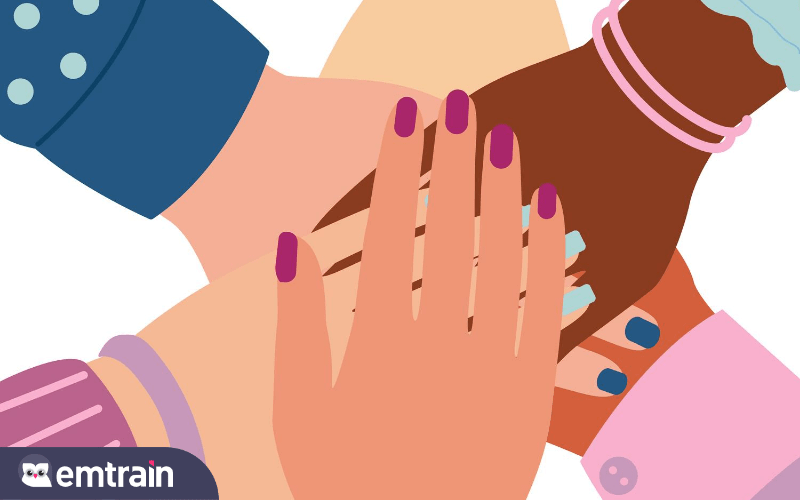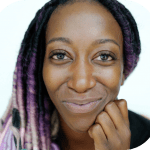We sat down with Nancy Douyon, design ethicist and product philosopher. Nancy has been a UI/UX designer (User Interface, User Experience) at Google, Uber, IBM, and Intel. She is an Emtrain Expert on Unconscious Bias. Nancy was interviewed in June 2020 by Laraine McKinnon, Emtrain’s Talent & Culture Strategist. This is a 4-part interview.
Laraine: Nancy, there’s an awareness today: whether it’s white people, Asian people, or Indian people understanding more of the plight of the Black community…or the Black community realizing that many more people are willing to listen in a way they hadn’t before. What do you think we should do with this heightened awareness?
Nancy: I would like to figure out how to get the privileged, which is all of us, to some extent, to consider leveraging whatever privilege they have.
If you are CEO, sitting down and having a transparent conversation with someone, or sitting with your board and saying, “Hey, we need to figure out how to bring somebody in here that’s been marginalized.” What do you have, within your power, that you can do?
That means that you should make an effort to recognize that we all have some privilege. I know what my privilege is. I am attractive to the largest tech companies globally. There’s got to be something to that even if it’s just knowledge sharing.
And I’m not saying ‘privilege’ as a term that should be bashed. I really think people think it’s a loaded term. I can see it on their faces each time I say the word privilege. “Oh, here we go…she’s coming for us.”
Laraine: Is there a better word…?
Nancy: I wish I could say ‘power’ instead, but I don’t feel like people understand that they have power. I think that’s the problem, which is why I lean towards privilege.
I want people to face the fact that they have this privilege. Even with COVID. I think: ‘I have a home, I have a roof over my head.’ I have so many things to be gracious about. What do you have to be gracious about? Maybe it’s a manager that believes in you or something like that.
I do really believe you can leverage your privilege. It could be as little as if you’re a man in a meeting and there’s women being interrupted in the room and saying, ‘hey, I’d like to hear what she has to say.”
Or going big as you set diversity goals. We were talking earlier about the power of inclusion for organizations. Instead of saying, “we’re going to bring one diverse person in this year,” be more aggressive about it. Let’s see if we can turn this team or this process or the system into a more inclusive one.
Be inclusive. Before that word gets watered down and torn apart. If you are going to hire somebody who’s the Chief Diversity Officer, actually give them the ability to do something beyond just the public relations piece.
I’m not saying I know the inner workings of it, but I definitely know that diversity people are fighting very hard. A lot of them look like me. They are trying to resolve our issues with very limited resources and no power.
If you’re going to say that you’re about corporate responsibility, recognize that that might mean you need to be transparent about some things, like showing where your organization stands today, and your plan to improve. Over the years, a few companies have said something like that, but I have not seen them follow up on the results. It’s about holding people accountable. I think in every sense of everything that’s going on right now. It’s about holding people accountable.
For example, I can say I want to build a more inclusive team and be very intentional about it. I can say to recruiters, ‘Hey, if you notice anyone who can help us reach our goal. Our goal is to bring this team to 50% diversity. We’re not trying to reach this 1%, 2% or 8%, we want to hit 30% by the 4th quarter and 50% by the second half of the new year. Let’s figure out how to do that. Our headcount is going to be leveraged towards that even if it takes us a little longer to fill. We’re expressly encouraging women and people of color to apply.’
If you have the ability to, bring somebody into a room that hasn’t been able to come into that room. If you look around and all of your board members are white, you might want to think about just inviting someone into the space. Or if you look around and there’s one woman…don’t buy that as an excuse that you did enough. The point is to create aggressive OKRs (Objectives and Key Results) that prioritize inclusion everywhere and every quarter.
Laraine: I have been thinking about my privilege and how I can best leverage it right now. For example, I can help explain the importance of “Black Lives Matter” in a way that acknowledges that I don’t have all the answers but can help relieve the Black community from having to do all the explaining. How else can allies step up without overstepping?
Nancy: Leveraging privilege is a call to action. I want people to do whatever they can do in their capacity. Maybe, ‘I’m a fashion designer and I handed out masks to protesters’ like one friend of mine has done.
And then publicize your solutions to the world so that you can lead by example. Almost as if to challenge others. ‘We can do it, why can’t you?’ Show that you’re not sitting around and saying, “I don’t know what to do.” Or sitting around waiting for your Black friends to tell you what to do. Instead, engage. Say, ‘I’m going to learn and understand…’
It has to be a challenge. And I don’t want it to be one of those things where people are bragging…that’s the Nobility Complex, when we self-serve. This is not making yourself the hero or patting yourself on the back. It’s about, ‘this is what I did with my privilege. I am telling the world I am the mayor and with that power, I have decided to make sure that my team salaries are bumped up so that the women and men are getting paid equally in my department.’ If it is in your capacity to do so, speak up, don’t be afraid, and do something.
I think that it was a great effort to do unconscious bias training. Right. Great effort. I’d love to see an annual list of metrics to show how you pushed the needle in real life. This percentage grew here, we retained this much, our program had this much satisfaction within this community, we were able to increase this.
But also share the bad. “We aren’t great but here’s how we plan to get better.”
Laraine: As companies are going out with their statements on Black Lives Matter and their commitment to improve, I wonder if there’s some way that we can hold companies accountable with a timestamp. On June 1st you said you were going to do this. On December 1 six months later, show us what you’ve done.
Nancy: I’ve talked about this. What if there was a trusted third party being responsible for it? So companies can’t sugarcoat it. I think something external needs to hold them accountable. I even think the government should get involved holding folks accountable. If there was some trusted review process that people could believe in, kind of like, a Yelp for companies fighting bias, I think that could be pretty effective.
I can even see a biannual report out. Here’s the top five companies. This year, they were able to take these actionable steps towards this. And as a result, the numbers went up the following year. They showed little improvement in this area, but here is their action plan for getting this done and here’s the plan for the next couple years. Or publicize all the goals and a timeline to tackle one thing at a time.
Laraine: There are many opportunities for us to leverage our privilege*, share it out, and hold each other accountable. Thank you, Nancy for sharing your journey and expertise in user design to inspire action.
Check out the other interview’s with Nancy Douyon:
Power of Inclusion
Designing for Inclusion
Interview with Nancy Douyon, Emtrain Expert
Nancy Douyon is available for fireside chats on human centered design and workplace inclusion.
What is the definition of Leverage your Privilege?
Using your privilege and advantages to advocate for and speak up for those who do not have the same privilege or authority.










